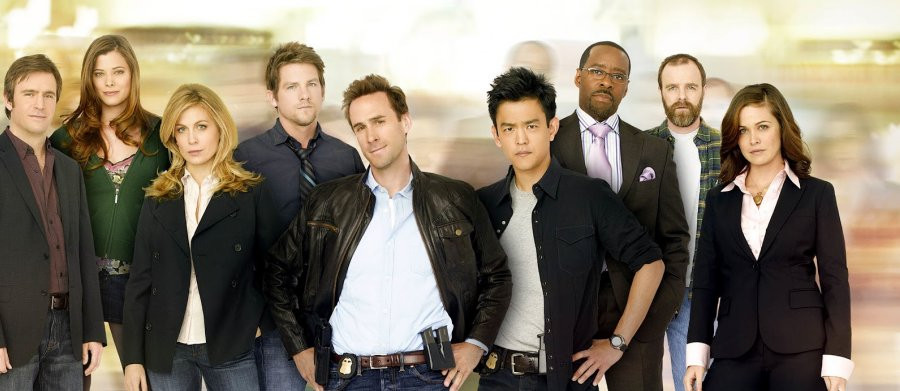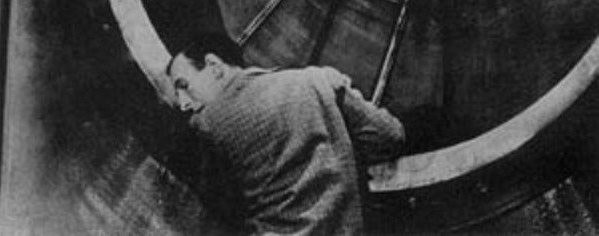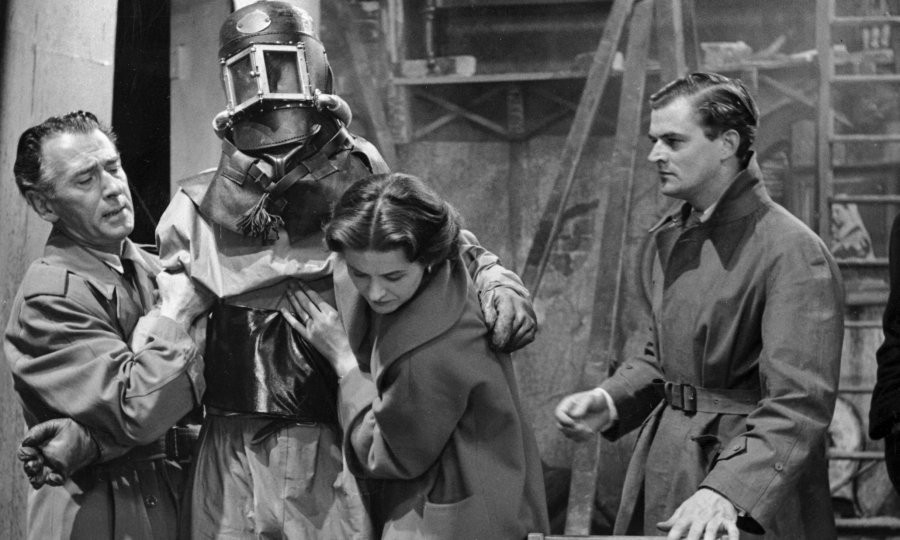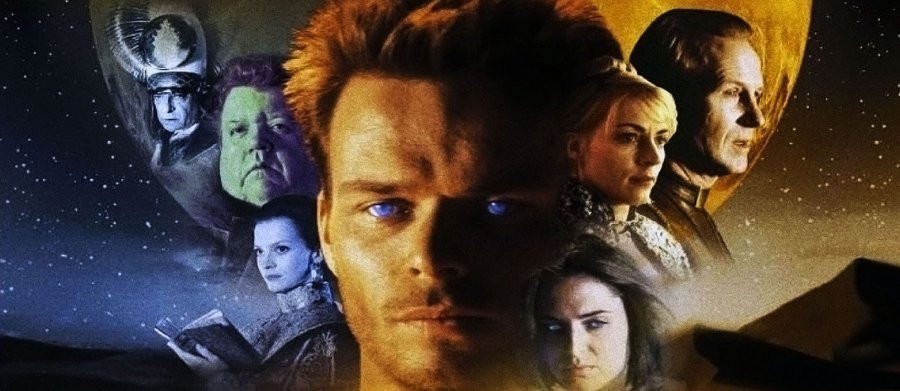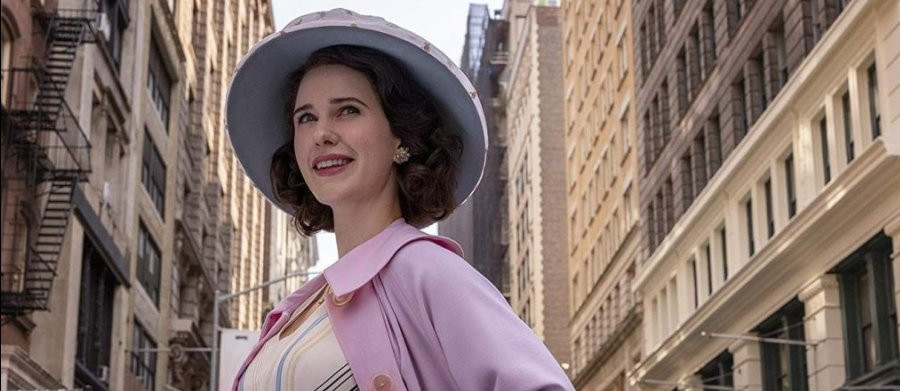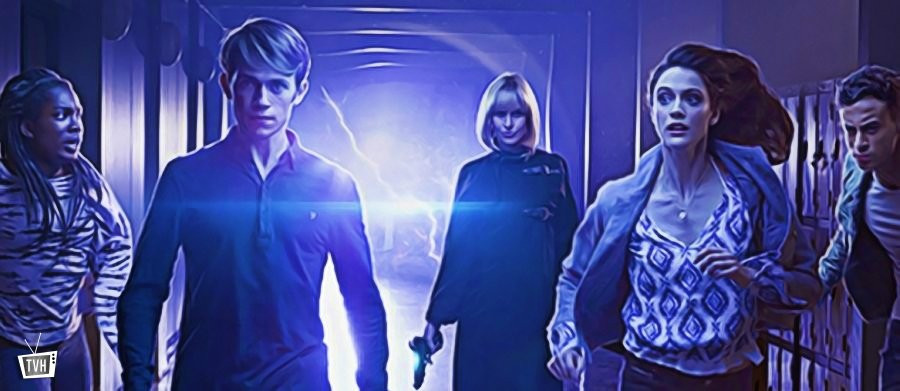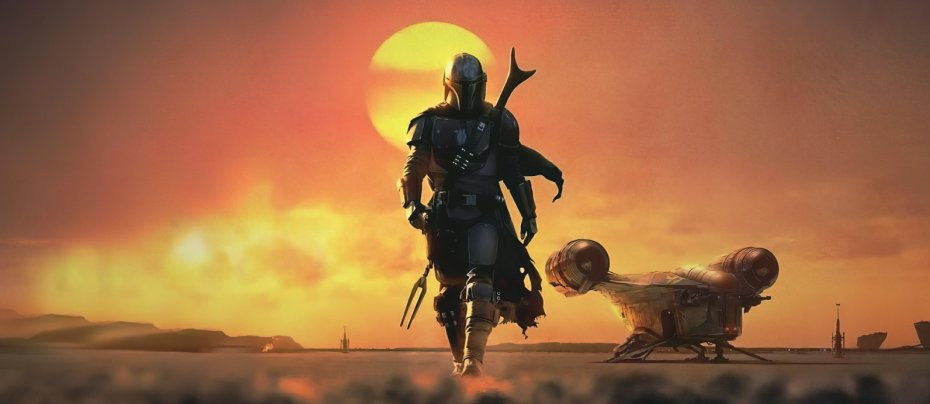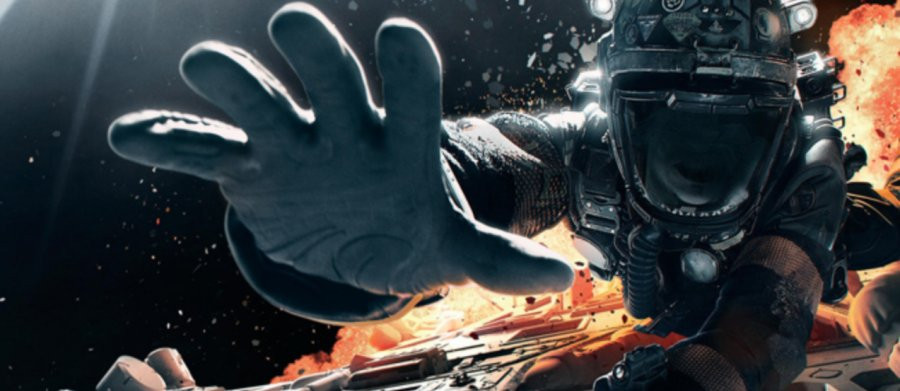
The Expanse - Seasons 2 to 6
2017 - United StatesSeason 2
The previous season ended with jaded but strangely romantic ex-detective Josephus Miller (Thomas Jane) teaming up with four survivors of the ice transporter 'Canterbury' on the Martian gunship they have renamed the 'Rocinante.'
This is the name Don Quixote gave to his horse, one of several not very subtle references to Cervantes' novel in the first season. Although it is the young Captain of "the Roci," James Holden (Steven Strait), who is presented deliberately as the dauntless knight born out of his proper time who wants to fight giants, it is Miller who is in many ways the more Quixotic character. The title of the very first episode of the show, 'Dulcinea,' is the name Don Quixote gives to a tavern girl on to whom he projects all his fantasies in much the same way that Miller projects his on to Julie Mao (Florence Faivre), the rich man's daughter he was assigned to track down.
So now that the principal Good Guys are all in one place, we can expect them to go off on a series of jolly adventures together...
No, this is The Expanse.
For one thing, they are far from one happy little crew. Although Holden and his fellow "Cant" survivors overcame some big differences and bonded over the first season, there are still deep cracks just beneath the surface, and Miller makes an uneasy addition. He feels completely lost since his great quest for his Dulcinea came to a very unromantic end, and then there is the minor matter of the brutish Amos (Wes Chatham) having killed one of his very few friends.
There are also a few plot issues left over from Season One - basically all of them in fact.
This is another of the apparently deliberate eccentricities of The Expanse. The structure of Season Two seems almost designed to be anti-commercial. Indeed, it is less a season than two separate half-seasons - or rather the first five episodes are in effect the conclusion of Season One and everything after that is the beginning of Season Three.
Yet the season begins by introducing a completely new strand that has absolutely nothing to do with what has gone before and seems at first a distraction from the ongoing story of which we are still in the middle. We meet Gunnery Sergeant Roberta "Bobbie" Draper (Frankie Adams) and her team of Marines training on Mars. Over the next few episodes we keep going back to them, and we find out a lot about them all and the developing relationships between them. They are obviously going to be very important later. It looks like they are the Martian equivalents of Holden and his team, possibly their mirror, possibly their future adversaries.
Wait and see. Remember this is The Expanse.
Meanwhile, on Earth, the political subplot centred on our favourite UN Deputy Under-Secretary for Executive Administration, Chrisjen Avasarala (Shohreh Aghdashloo), becomes more relevant and more interesting as mutual incomprehension of events out in Space heat up the Cold War between Earth and Mars. Avasarala herself gets a useful sidekick in the welcome form of Nick E Tarabay as Cotyar Ghazi, an experienced and world weary security specialist. Tarabay played a similar role in the excellent Person of Interest, but is probably best remembered as the scheming slave Ashur in Spartacus: Blood and Sand. He is always value for money.
On the 'Rocinante' itself, a weird family atmosphere has developed. Engineer Naomi Nagata (Dominique Tipper) and Holden are now a sort of surrogate Mum and Dad, while Amos and Pilot Alex Kamal (Cas Anvar) have got through their squabbling siblings’ phase with Amos becoming rather protective of Alex - but only because, as he tells Alex bluntly to his face, he considers him a weakling. The development of the character of Amos, or rather the discovery that he is a man of many layers, is one of the great joys of Season Two. He is far more than the stupid thug and apparent psychopath we met in Season One. There are obvious comparisons with Adam Baldwin's immortal Jayne Cobb in Firefly, except Amos is much deeper. Although he is honest that there are things about which he knows little and defers to others, especially Naomi, he turns out to be a perceptive man with considerable insight into human nature. This is based on life experience of which we are given only hints at this stage. It is a great performance by Chatham who keeps us guessing about Amos' true nature.
By contrast, the writers seem to have been at a loss with what to do with Miller, previously the most interesting character and played by the most substantial actor in the regular cast. The 'Rocinante' is obviously too small for two leading men. It is consistent with his arc that Miller should feel lost and uncertain after the failure of his quest. Even so, it is a rare lapse in the writing that Miller seems to bond with the crew of the 'Rocinante' far too quickly and then falls out with them equally abruptly - over an incident that should have been very predictable and would have generated none of the moral outrage on display, even if it did cause a lot of unnecessary inconvenience. It seemed like conflict for the sake of conflict.
Everything changes with the pivotal fifth episode of the season, 'Home.' It is masterpiece of dramatic tension. There is real uncertainty whether a leading character might live or die as tragic destiny, hope, despair, and a strange catharsis succeed each other. It is ultimately very moving. A deeply flawed man, not a perfect Saviour, drags himself painfully towards his personal Calvary, carrying not a Cross but a nuclear bomb, which he has to keep resetting to stop it from exploding, with the salvation of the whole Solar System at stake.
After what feels like a finale, the show spins off in a whole new direction. The political manoeuvring between Avasarala and her political rival Sadavir Errinwright (Shawn Doyle, deliciously slimy) comes to the fore. Circumstances force Avasarala, Cotyar, and, most surprisingly, Bobbie to work together - and they make a great team.
A completely new subplot involves a scientist friend of Avasarala's setting out on a mission headed by a traditionally stubborn military man. This sets up some good dramatic conflict which is resolved as both characters develop - the opposite of the Miller-Holden misstep. These people are also obviously going to be important later...
It is good to see Jared Harris return as "Belter" rabble rouser Anderson Dawes. Sadly, he is only there for a couple of episodes, but he has a great scene at a political meeting, where the director gives him a superb low key entrance, and where he gets to do what he does best. This sets up another interesting subplot ...which has been ignored ever since. At the time of writing, it has been announced that the upcoming sixth season will be the last. If so, it will be very disappointing if the producers do not get Harris back to wrap things up as Dawes deserves.
It was also good to see the juvenile delinquent Diogo (Andrew Rotilio) from Season One maturing - a bit - as he finds a new role in life. He becomes half of a surprisingly likeable double act with Miller.
The visual effects are, once again, stunning, especially in that outstanding fifth episode. We start to see part of the grubby underside of Earth, which was previously only mentioned in passing by the powerful bureaucrats in their glass palaces. We also see something of Mars. If anything, the Martians, exemplified by Bobbie Draper, are even more admirable close up - serious, patriotic, hard working, determined - especially compared with the Earthers, but we are given hints that even there all is not well.
Season Two of The Expanse delivers what Season One set up, and it delivers with style. It excels in almost every department. There are no weak links in the cast. Frankie Adams does particularly well in a difficult role, at first a convincing leader of men, then a vulnerable young woman lost in a world where all her basic assumptions begin to crumble, and finally a warrior rediscovering who she really is. Cara Gee also makes a mark as a character introduced at first known in the cast list only as "Fred Johnson's Second in Command" but later given the name Camina Drummer. Chad L Coleman shows us a more political side to Johnson.
The only real weakness is that we are never really sure where the story is. Is Holden our hero? Or Miller? Or Avasarala? Or perhaps even latecomer Bobbie? Miller's epic quest for his Dulcinea is replaced by a botanist's search for his young daughter, which is worthier but not as compelling. Sometimes we are watching 'Alien,' sometimes 'Starship Troopers,' and sometimes Game of Thrones in Space. Only in the next season do we get a clearer sense of direction.
Season 3
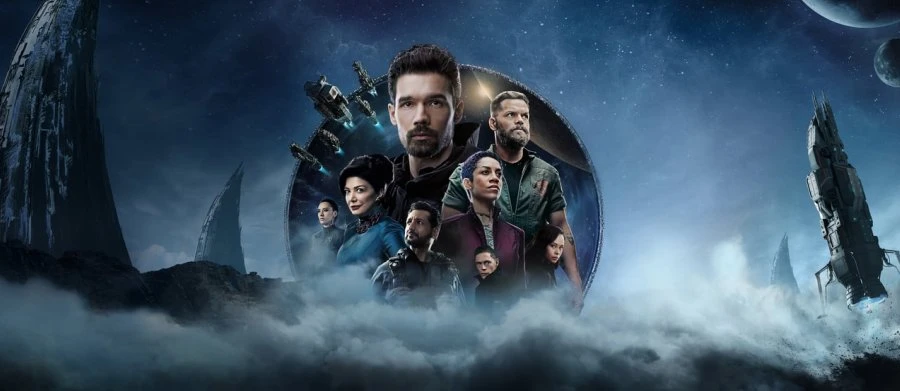
Like Season Two, Season Three suffers - and it really does suffer - from a decidedly odd structure. Once again, it is divided into two distinct halves. The first six episodes are really just an immediate continuation and then conclusion of the second half of Season Two. Everything after that is basically a completely separate story. Happily, this time we do not have to wait for the next season for the conclusion of that story as we had to do twice before.
It was at the end of this season that the show was cancelled by the'Syfy' Channel, so the ending looked very final indeed at that point. In the event the cancellation did not turn out to be total: a few days later The Expanse was picked up by Amazon and became "the show saved by the fans." Since then Amazon have, at the time of writing, made two shorter and more self contained seasons that have worked a lot better as narratives, while maintaining longer story and character arcs. A sixth is in production and currently intended as the last, despite the authors of the books on which the series is based maintaining that more material is available.
Season Two ended on what was not so much a "cliffhanger" as an accelerating drive to the cliff. Season Three begins with everything finally going over the edge. The Cold War between Earth and Mars gets officially hot.
At first, the principal characters seem to have been rather left behind by the plot, as the focus shifts to the movement of great fleets and nuclear strikes resulting in megadeaths. However, a series of convenient coincidences finally unites all surviving principals, including UN Deputy Under-Secretary Chrisjen Avasarala (Shohreh Aghdashloo) and Martian Marine Bobbie Draper (Frankie Adams) with James Holden (Steven Strait) and his crew, on the rogue gunship 'Rocinante.' This is the only time this ever happens and it is good while it lasts.
It nevertheless presents our heroes with a dilemma: they must choose between prioritising their existing quest to rescue the daughter of gentle botanist Prax Meng (Terry Chen), with whom Amos (Wes Chatham) forges an unlikely friendship, or getting out a message for Avasarala that might stop the War.
Avasarala is sorely missed back on Earth, where her absence means there is no one to counteract the influence of her ruthless rival Sadavir Errinwright (Shawn Doyle) on the Secretary-General of the United Nations, who is now the ruler of the whole planet. Secretary-General Sorrento-Gillis (Jonathan Whittaker), elected as a radical reformer, has an impressive appearance but is gradually revealed as a vain, weak, vacillating politician who lacks direction in a crisis and is putty in the hands of his advisers. It is an all too credible characterisation of a leader out of his depth.
The "good angel" on his shoulder in Avasarala's place is a new character, Dr Anna Volovodov. Formerly a radical political activist with Sorrento-Gillis, she is a lesbian, a mother, a nurse, and a Methodist Pastor. That sentence might provoke fears that she is one of those box ticking characters that have spoiled so many recent productions. However, this is where The Expanse shows its superiority. It presents us with a flawed, complicated, fully rounded woman, not a label. Compassionate and warm, she can also be selfish, arrogant, judgemental, and sanctimonious. Her political beliefs can seem naive and at one point they influence a decision that costs many lives. She is outmanoeuvred easily by the experienced Errinwright - which Avasarala would not have been. She can appear nervous and vulnerable. Yet she learns from her mistakes, and she proves to be brave and decisive at crucial moments. Later in the season an apparently foolhardy act makes her the right woman at the right time to pull off a surprise rescue. It helps that she is played with great skill and charm by genre veteran Elizabeth Mitchell from Revolution and the reboot of V.
This is perhaps a good place to note that the "villains" are in general one of the great strengths of The Expanse. Apart from a couple of mad scientists, who, it is implied, got so consumed by their work that they lost all sense of proportion and morality, the antagonists are all three dimensional characters. Errinwright and his industrialist "frenemy" Jules-Pierre Mao (Francois Chau) are given defensible points of view and moments of humanity. Errinwright is actually a very good "Wartime Consigliere." He understands that risk and sacrifice may be necessary to save lives overall. He provokes a war not because he is bloodthirsty but because he believes it is inevitable and calculates that his side has a better chance if it happens earlier. He plays the odds sensibly. At the same time, it was difficult not to feel at least some sympathy in the previous season when we saw him trying to prepare his son for what at that point looked like his imminent disgrace or suicide. Even Mao has a moment of conscience, or at least sentiment, when he seems to throw away his own interests by ordering an end to experimentation on children - needless to say, it does not last.
Everything comes to a head in the sixth episode as it did in the fifth of the previous season. To be honest, this lacks the emotional punch of the latter, but there is still quite a toll among supporting characters, and Bobbie Draper has a good scene proving the easy superiority of a trained professional soldier in full combat gear over even the best amateurs with guns. 'Star Wars' franchise please note.
Then, in the very next episode, everything is suddenly very different and an entirely new story begins. It is rather disorienting. Several months have passed and much has happened off camera. Avasarala has had a big promotion, which seems a bit unlikely: yes, she deserves it, but it is not exactly common in politics for virtue to be rewarded so promptly.
Meanwhile, the "Belters" of the Outer Planets Alliance (OPA) appear to have established some sort of independence, but it is not clear who, if anyone, is in charge. Fred Johnson (Chad L Coleman) somehow rustled up a fleet of salvage vessels earlier and put them under the command of his right hand woman, Camina Drummer (Cara Gee), to salvage the biggest ship in the System, which he had previously built for, and then stolen from, the Mormons. This is now the flagship of a new OPA Navy. Drummer retains command, but, as part of an off screen deal between Johnson and OPA demagogue Anderson Dawes, she must accept a contingent of Dawes loyalists among her officers.
These arrive wearing spiffy new OPA Navy uniforms, but the clothes cover a rum bunch of characters, including a former pirate as Camina's First Officer, and our old friend Diogo (Andrew Rotilio), who has somehow become a Lieutenant, which says a lot about the new Navy.
By far the best aspect of this second half of Season Three is the evolving relationship between Drummer and her unwanted First Officer, Klaes Ashford. Since the latter is played by the superb David Strathairn, it is no surprise that he steals the whole show. Convincingly fluent in "Belter Creole," Strathairn, usually noted for tightly controlled characterisations, here makes the deliberate choice to cut loose completely and go "full pirate," which is what the part demands.
Yet there is subtlety too. There is real ambiguity about whether Ashford is here, as Drummer assumes, to subvert her command, or whether he is actually trying very hard to be a loyal and effective First Officer. Perhaps Ashford is not certain himself. He has certainly got a better grasp than Drummer of how they will all need to change if they are to establish a new Navy and a new nation. At times he is genuinely supportive, not least when Drummer gives a cracker of a speech before taking her ship into a very dangerous situation. Gee also deserves a lot of credit for the way she has developed her character from relatively humble beginnings, and she makes a great double act with Strathairn, sometimes adversarial, sometimes a headstrong youngster learning reluctantly from a more experienced mentor.
While there is therefore no shortage of human conflict in the later episodes of the season, it is secondary to the main plotline, which is more in Arthur C Clarke territory. The bickering humans are forced to unite when threatened by an incomprehensible unseen power. Although this failure to put a human face on the main adversary does rather reduce the dramatic tension of the second half, this is balanced by the welcome (sort of) return of a major character from before, which is given a scientifically credible explanation rather than ascribed to fake mysticism.
The visual style of The Expanse continues to be as compelling as the characters and story. Some of the rather surreal effects in the second half of the season may be a matter of personal taste, but the evocation of the Northern Lights is quite sublime.
For all its structural oddity, Season Three is where The Expanse really came of age. All the story and character arcs finally came together in a single cohesive plotline, and it includes some of the highest rated episodes on IMDb. More importantly, the characters and their relationships were fully established, providing a solid platform for future seasons. No wonder that fans were particularly upset by its cancellation by 'Syfy' and relieved by its rescue by Amazon. It is perhaps not so much the peak of The Expanse as finally reaching the plateau after a long climb. Some of the best was yet to come.
Season 4
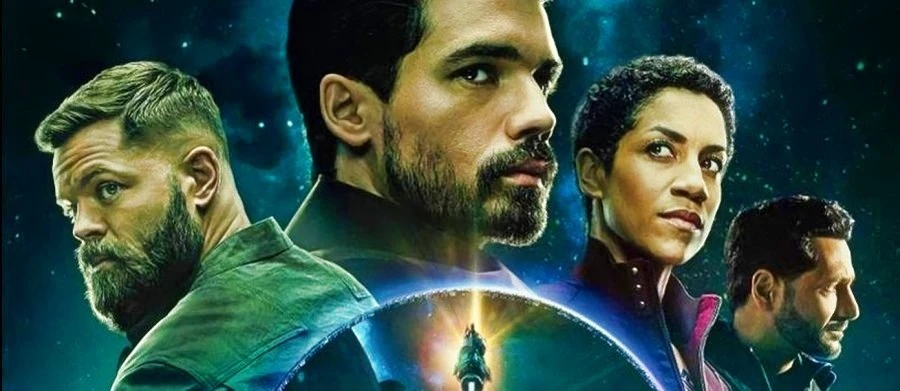
Season Four represents a fundamental change. It was the first following the show's dramatic cancellation by 'Syfy' and its even more dramatic rescue a few days later by Amazon. As usual in such situations, the new management was eager to make its mark on its recently acquired property. What was more unusual was that its "improvements" really were improvements.
The first was the most significant: following their usual practice, Amazon commissioned a shorter season. This had several benefits. It tightened up the storytelling. It also ended the rather eccentric practice of effectively dividing a season into separate half-seasons, each with its own main storyline. While maintaining longer arcs that connect what has gone before with what is to come, Season Four has a self contained principal plot with a beginning, a middle, and an end, which is far more satisfying.
This takes the 'Rocinante' to a frontier planet, away from great events on Earth and Mars - a device that may be a narrative necessity because the second half of the previous season demonstrated how our heroes are now celebrities, having saved the Solar System a couple of times. UN bigwig Chrisjen Avasarala (Shohreh Aghdashloo) calls in a favour after sorting out some legal problems, a nice touch, and Captain James Holden (Steven Strait) and his crew are sent to investigate a disturbing natural (?) phenomenon on one of a large number of new worlds suddenly opened up to human exploration, in part by his own actions.
If this sounds unglamorous, the reality turns out to be even more so. The planet in question is a grey, depressing place, but it is already home to a band of poor, desperate "Belter" settlers from devastated Ganymede. Its rich lithium deposits have also attracted the attention of an Earth based corporation. This is obviously the same basic set up as a hundred Westerns and Western tributes, and for a while it seems to be playing out a lot like 'Shane' and 'Pale Rider,' but, The Expanse being The Expanse, the unexpected soon takes over.
The season is practically stolen by Burn Gorman as corporate enforcer Adolphus Murtry. If a character is called Adolphus, it is a fair bet that he is probably not going to turn out to be a good guy. One has to sympathise with Murtry to this extent: he was doomed by his parents, or the writers, when they gave him his name. Gorman is a versatile actor but at his best as a villain, most memorably the out of control Karl Tanner in Game of Thrones. Here he is far more controlled but just as psychotic when he gets the chance. The rest of the time he is calm and reasonable on the surface, and it is, significantly, Amos (Wes Chatham) who recognises his true nature, resulting in one of the best scenes of the season, crackling with suppressed aggression.
Yet one of the things that makes The Expanse different is its understanding that no one is entirely good or evil, right or wrong. Although it does not excuse either his character or his actions, the point is well made that Murtry is not unjustified in some of his basic assumptions. It is the more likeable characters who actually cause problems, and, if people like Murtry overreact in response, it is only because they believe it is a necessity. Murtry has good reason to treat the settlers as hostile, and that it is predictable that Holden and his crew side with the latter makes them legitimate targets. An unpleasant man may still have a valid point of view.
It is perhaps a pity that a lot of McGuffin stuff about the phenomenon Holden was sent to investigate rather overshadows this fascinating human conflict in the later episodes, but it does set up some tense and exciting sequences. We even get the unique spectacle of Amos visibly frightened by something - which is actually rather frightening in itself.
While all this is playing out on a single newly discovered planet, the fact that there are suddenly hundreds of such planets has immense repercussions on Earth, Mars, and the Outer Planets. Events on what the "Belters" call Ilus and the "Earthers" New Terra are just a single case in a general rush to colonise and exploit the new territories.
Avasarala, who seems about the only person in authority who remembers recent events, very sensibly urges caution until more is known - hence her concern about that strange phenomenon and sending Holden on his mission. However, the UN has elections and a demagogic candidate proclaims colonisation as the answer to all of Earth's problems. In particular, there is mass unemployment, overcrowding, and environmental collapse due to a huge surplus population, so there is no shortage of voters willing to listen to claims of quick and easy solutions.
Worse, those claims are made by a candidate who is young and pretty, and who has a good backstory, having risen from poverty against incredible odds. This presents a sharp contrast with Avasarala herself, a child of privilege from a political family. This makes her a politician to her fingertips, and her political wisdom was proved by her previous determination to stay under cover in the bureaucracy rather than seek elected office herself, because it also means she cannot even pretend to be a woman of the people. Some of the qualities that make her a great statesmen make her a poor candidate: her intellectual superiority comes across as arrogance and her pragmatism as insincerity. A typically ruthless political decision backfires badly.
Mars is experiencing similar pressures. Martians were always willing to endure great sacrifices to achieve the long term objective of terraforming their planet. The sudden availability of an indefinite number of more suitable planets suddenly makes that look redundant. At the same time, the decommissioning of much of the Fleet in which they took such great pride leaves many Martians feeling lost, not least, our old friend Bobbie Draper (Frankie Adams).
Ironically the most patriotic of Martians, she has been disgraced for doing her duty and is forced to participate in the organised theft of military surplus. It is another great example of the willingness of The Expanse to consider all perspectives that even the ruthless criminals who threaten someone she loves become more sympathetic as she, and we, get to know them better.
Yet we also get clever hints that all was never well with Mars. It was evidently always a Police State, backed by a high degree of social conformity. Propaganda is everywhere, casually permeating every aspect of production design. The parallels with the Soviet Union become more obvious, except general standards of living appear to be much higher on Mars than on Earth, the analogue for the late 20th and early 21st Century West in The Expanse.
Meanwhile the Belt is represented by the enjoyable double act of Camina Drummer (Cara Gee) and Klaes Ashford (David Strathairn), cautiously reconciled after their, er, interpersonal difficulties at the end of the previous season. The former is still commander of the biggest vessel in the Solar System, now a space station, while the latter has his own ship again - hunting pirates, which is ironic since that was his own former occupation.
The worst of these is a cold blooded killer called Marco Inaros (Keon Alexander), but he is young and good looking so he literally gets away with murder. For all his political rhetoric, Inaros is an opportunistic psychopath and in many ways even Murtry is a more admirable personality. Chad L Coleman makes a brief return as Colonel Fred Johnson, but, for some reason, he is no longer the commanding figure of previous seasons.
In multistrand drama there are usually some storylines that are appreciably weaker than others. Here we have a rare example of four strong plots running in tandem. If it is, as always, frustrating to leave a particularly exciting one, it does not matter so much because something interesting is usually happening in the one that takes its place. The principal characters and relationships are now well established. The guest and supporting characters are treated as human beings, not plot devices. The season ends with a shock that will stay in the mind, and, while the main story arc of the season is complete, things are set up nicely for Season Five.
There is less visual beauty than in previous seasons. The Canadian quarry that serves as the location for the harsh frontier planet Ilus/New Terra was chosen deliberately for its unpleasant appearance. Someone obviously loves 'Lord of the Rings' because there are constant references in the use of effects. Elsewhere, it is interesting to see life on Mars - which is apparently one big Holiday Inn, clean and comfortable but a bit soulless - and fun to see Avasarala enjoying the high life. Again, the contrast between her casual privilege and the lives of everyone else in the show speaks for itself, as does the fact that she seems wholly oblivious to it. Her brightly coloured clothes have always been a visual delight in their own right - even Amos is fascinated - and it is a voyeuristic treat to get a peek inside her actual wardrobe. It is not small.
Every aspect of the production is handled with perfect professionalism. If you want to see a recent example of a show that has reached maturity and is running at its peak, Season Four of The Expanse is as good as anything currently being made at the time of writing.
Season 5
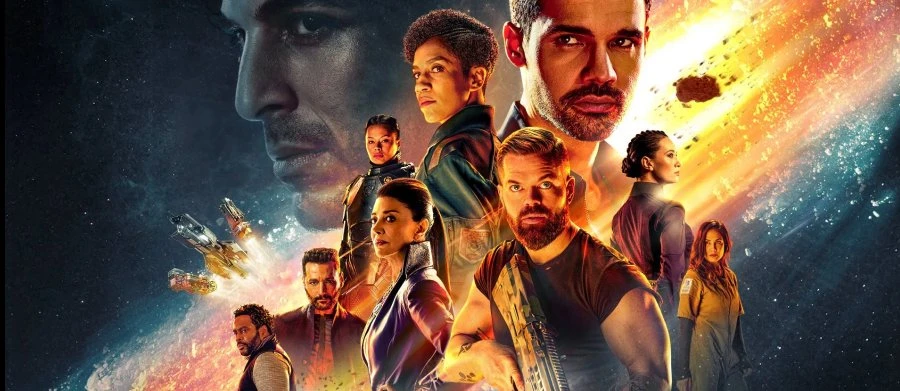
Season Four consisted of a self contained main storyline, which concluded at the end of that season, and three apparently unrelated subsidiary plotlines, which are now woven neatly and conveniently together into one in Season Five.
Bobbie's investigation of the Martian arms trade, the ups and downs of Avasarala's political career, and the problems the "Belters" are having with Marco Inaros, who seemed at first to be no more than an irritant, all turn out to be related. It is a masterpiece of construction, and the whole season is tied together, very obviously, by a definite common theme: Family.
The season begins with the crew which is now established as a family in its own right on the 'Rocinante' going their separate ways, if only for a little - it is assumed - while their gunship is being repaired at Tycho station. Amos, Alex, and Naomi take leave to meet what they see as family obligations from their previous lives on Mars, Earth, and Pallas station respectively.
Left alone, Holden (Steven Strait) ends up gathering a temporary family around him, including pushy journalist Monica Stuart (Anna Hopkins) from Season Three and Bull (Jose Zuniga), apparently Fred Johnson's new Second in Command at Tycho. Bull is part of Johnson's own substitute family, but all is not well there. In the previous season Johnson (Chad L Coleman) fell out with his previous Second in Command, Carina Drummer (Cara Gee), who resigned from the OPA Navy in a huff and has become a pirate. Do we see the influence of her other substitute father, Klaes Ashford, in that? It is no surprise that she has immediately become leader of her own small faction within the OPA. Yet her crew seem more like a hippie commune than pirates. They too consider themselves a family, with Sandrine Holt as a very unpiratical mother figure.
Meanwhile, Amos, Alex, and Naomi have not met with warm family reunions of their own. This is hardly surprising since they all, with differing levels of justification, made the deliberate choice of walking out on their previous families.
Alex (Cas Anvar) is the least deserving of sympathy, and he gets none. That said, what we see of his wife makes his decision understandable if still indefensible. Perhaps she was not like this before? Perhaps it was the otherwise amiable Alex who made her so? We are in no position to judge. Perhaps that is the moral of this part of the story, that outsiders know nothing about what happens within families.
However, he falls in with Bobbie (Frankie Adams), whose own family was an important part of her life in the previous season but who is now drifting in every sense. In spite of Alex evidently wanting to think of himself as a ladies' man, his relationship with fellow Martian 'Rocinante' veteran is strictly brother and sister. This is believable because, although Bobbie is a likeable character, and is played by a very attractive woman, there is something quite daunting about the former Marine Gunnery Sergeant. She is given another opportunity later in the season to remind us how frighteningly proficient she is at killing people.
It also has to be said that Naomi's attempts to reunite with her long lost child are rather pathetic and out of character. One has to agree with the response that she left it too late. Naomi (Dominique Tipper) was a strong character in the first three seasons, but rather on the bench in the fourth, so the prospect of her carrying the plot forward again in the fifth was very welcome, and the weak, whining Naomi we see in the first half of the season is therefore rather a disappointment. However, we get the tough, resourceful, highly motivated engineer we know and love back with a vengeance in the later episodes, in which a woman alone simply does not give up in her efforts against the odds to save her own life and those she loves.
By that stage, she has been in contact with yet another renegade crew that likes to call itself a family, but in this case it is a toxic family, headed by the manipulative Marco Inaros (Keon Alexander). He is a true psychopath. He cares little for others but enjoys the power he has over them by playing with their feelings for him. We see clearly, as his followers cannot, how he uses charm, threats, and fake emotion alternately to control them. They love him and want his approval, never realising how little he cares for them, which is why he always has the advantage. As his public importance suddenly increases, his good looks make him a sort of Che Guevara: he appears perfect on the poster, or in this case on the video screen, but behind the image is only a hollow, hate filled narcissist.
He is rare example in The Expanse of a villain with, so far, no redeeming features.
Redemption is a major theme in Amos' thread, not that he would ever put it in those terms himself. We always knew that Amos (Wes Chatham) had "a past" and it turns out that his childhood was even more horrible than most of us would want to imagine. Yet even there he found a sort of substitute family. He returns to Baltimore, which seems not much changed from The Wire, to find the people he sort of loved either dead or unwelcoming. Then dramatic events lead him to form what he calls a "tribe," which is also of course a family, around him.
This begins with Clarissa Mao (Nadine Nicole), the murderer from Season Four, with whom Amos has forged one of his odd friendships. Guarded as he is, if Amos decides he likes someone, he really likes them, and his loyalty is absolute. Clarissa has family issues of her own, being the sister of the wayward Juliette Mao, whose disappearance kicked everything off in Season One, and the less favoured daughter of wealthy industrialist Jules-Pierre Mao, who nearly destroyed the Solar System in Season Three. It is typical of the way The Expanse shows that there at least two sides to everything, and everyone, that, as we get to know her better, we see something of what Amos sees in her. Her character arc begs the question: if another toxic family made her a toxic person, might she be a good person in a good family?
The events which prompt Amos to gather his own family or tribe also revive the runaway Holden's concern for his strange biological family back in Earth and the career obsessed Avasarala's for her neglected husband.
Notice the repeated use of the word "family" in the preceding paragraphs? It is no accident. A drinking game in which one drank something every time the actual script either mentioned the word or alluded to the concept would not last long. As if that was not enough, Naomi is given a big speech in the final episode which rather beats us over the head with the moral of the story - as if we had not worked it out already!
This does not detract from the fact that it is a good moral, a good story, and a very good season.
As if conscious that Season Four, due to the dramatic necessity of emphasising the depressing greyness of the frontier planet of Ilus/New Terra, lacked the visual splendour of previous seasons, Season Five invests heavily in some of the best effects and location work we have seen so far. We are given some lovely looking space battles: it is always a treat to see 'Rocinante' firing on all guns. We also get to see more of Earth, Mars, and Luna, where Avasarala (Shohreh Aghdashloo) now has her office - an extreme case of having your desk moved further towards the door, a few hundred thousand miles further. The Mars scenes seem to reference Verhoeven's 'Total Recall,' a pleasing touch for genre fans. The only criticism is that the bits of Earth we see are not much different from today. The dialogue explains that a forest where we spend some time is unusual because it is a well supported nature conservancy. Perhaps we ought to have been shown more of the environmental devastation mentioned before.
The acting remains of a very high quality. Michael Irby, the President of Mayans MC, is a good political Admiral. It is perhaps a missed opportunity not to have used more of Frankie Faison, who appears in a poignant guest role in an early episode. Brent Sexton does well to build sympathy for a conflicted member of Marco's "family" in spite of being him introduced committing a particularly vicious crime. We really should not like him as much as we do.
There is no avoiding a spoiler alert at this point. A major character event occurs in the final episode, prompted by events off screen about which it is beyond the scope of this review to comment. Suffice it to say that, in purely dramatic terms, the change is definitely not for the better. Nevertheless, the decision being made, the production team deserve credit for treating the character with respect and handling the situation tastefully. It is also satisfying that the way it is done is consistent with something that was said in a previous season, and is apparently also mentioned in the books in respect of another character. Such things happen in Space.
The main storyline does not end neatly with the season, but it enters a new phase and will doubtless be resolved in the next season because, at the time of writing, it is, sadly, scheduled to be the last. If so, everything is set up nicely to go out in style.
Season 6
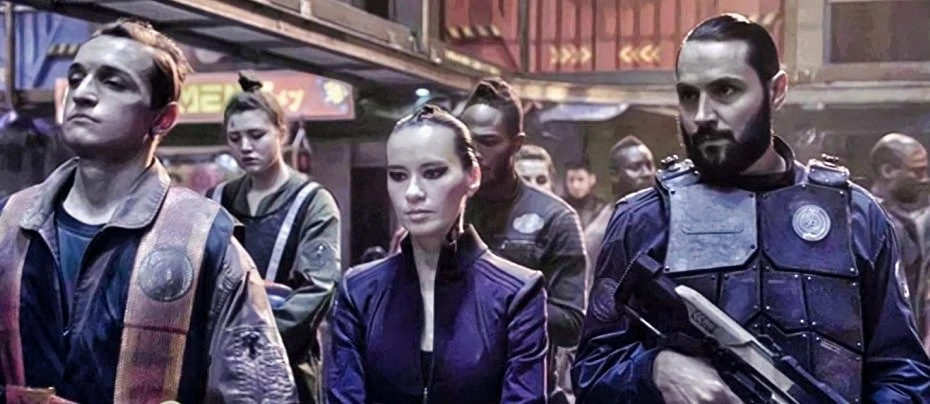
If the short sixth season has left some fans feeling dissatisfied, it has to be said that most of the dissatisfaction is due to the show being cancelled rather than to the way it wrapped up. There are still stories to be told in this universe - and indeed the final season developed a new one that was never resolved properly. It was, appropriately, about resurrection, which might be symbolic, or at least ironic, in the context of the history of the show itself. It is perhaps a hint that even now the writers and producers are hoping that it will be brought back miraculously after cancellation - as it has before.
Three seasons ago it was purchased by Amazon after being dropped by 'Syfy' in a deal that was itself symbolic of how the industry is changing. However, the nature of the streaming service business model means that it is more important to attract new subscribers than to keep them happy. From Amazon's point of view, securing the relatively small but dedicated fan base The Expanse had built up made a lot of sense, but the problem that had led to its first cancellation remained: its visibly very high quality production is clearly not cheap, especially on a cost per viewer basis. Once those viewers were safely signed up, Amazon derived no more direct income from them, since there is no advertising revenue in their model. So 'The Expanse' had become simply "The Expense."
There is a probability that cancellation will lose Amazon some of those subscribers, but that was always going to be the case whenever it happened. Amazon have clearly made the brutal calculation that, after three years, enough of those who followed The Expanse to their platform will keep their subscriptions out of inertia or because they have become attracted by other Amazon products. As viewers, we have little right to complain because without Amazon we would never have had those three extra seasons.
This commercial reality is evident in the way Season Six rather rushes to the end and cuts costs as it does so. It was reduced from the standard Amazon ten episodes to a mere six - less than half the thirteen episode sagas of its last two seasons on 'Syfy' - giving it more the feel of a "miniseries" than a full season of television. As a result, the storytelling and character development seems a bit perfunctory in places. At one point there is a conflict between Naomi (Dominique Tipper) and Clarissa (Nadine Nicole), but this lasts only a couple of scenes. There are hints of a mutual attraction between Amos (Wes Chatham) and Bobbie (Frankie Adams) which appear to go nowhere.
While the general standard of the photography and visual effects that have always been two of the show's great strengths remains extremely high, with some breathtakingly beautiful scenes, there are other moments that seem jarringly out of place because someone has cut corners - all the more out of place because the rest is so professional. It should be emphasised that this remains to the end an outstanding show visually as well as dramatically, but sometimes a "last day at work" ethic seems to have crept in.
We do at least get a clear resolution to the main storyline as the conflict between Marco Inaros (Keon Alexander) and the united forces of Earth, Mars, and the "Belter" factions opposed to him comes to its conclusion. Given the inequality of firepower, it is no spoiler to say who is more likely to win: even Inaros himself seems to be falling apart, but he still has a couple more cards left to play. To be honest they are not great cards, and the stakes are reduced as the game nears its completion. What seems in the first episode an almost existential threat to Earth is resolved very easily by a convenient discovery and ultimately, we are reduced to no more than anticipating a terrorist getting his well deserved comeuppance. Even this turns out to be too abrupt to be really satisfying.
The limp ending to the limp subplot about Naomi's charmless long lost son Filip (Jasai Chase-Owens) strikes a wrong note. Naomi herself shows more maturity than the writers in holding him to account for his actions. We are supposed to feel sympathy for the misled boy, but he was offered choices and he made his own decisions.
The political settlement was equally predictable. Indeed, what was harder to foresee was our canny UN Secretary General Chrisjen Avasarala (Shohreh Aghdashloo) not foreseeing it.
There are parallels with what is euphemistically called the "controversial" ending of Game of Thrones in this respect. Yet The Expanse stops short of going full Game of Thrones, mainly because at least most of the main characters stay true to themselves. It is good to see the old Naomi back at full strength, and Holden (Steven Strait) manages to maintain the right balance between heroism and humanity - there was always a danger of the character becoming either a cartoon version of Jesus or too laid back, and Strait manages to avoid both of these traps.
Clarissa is given a good redemptive arc: unlike Filip, she faces up to what she did and tries to do some good to balance the books a little. Amos is Amos to the end, which is a relief: the temptation with stoical characters is to give them some great emotional catharsis, which would definitely have been wrong in his case. Similarly, Bobbie rediscovers her inner Marine Gunnery Sergeant and spends most of the season mildly exasperated, which suits her. Come to think of it, the potential of Amos and Bobbie getting together looks so obvious in retrospect that it is surprising that the writers did not explore it earlier. It would be a gift for "shippers" and set up a sequel in which their children would probably end up ruling the Galaxy.
Despite a couple of wobbles, the family atmosphere on the 'Rocinante' is re-established, and it could be argued that the real emotional highpoint is not the final battle but the friendly meal the crew share just before it begins. It is fun just to hang out with the gang one last time.
It is particularly pleasing that Alex is not forgotten in all this. Several other characters from earlier seasons also make brief cameo appearances, acknowledging the history of the show. It is, however, a big missed opportunity when Anderson Dawes is dismissed in a single line in the first episode. Jared Harris must be too busy or too expensive now. The new character of a politically ambiguous administrator brought in to take his place is a poor substitutes.
The battle scenes are, once again, wholly credible. Vessel to vessel combat in Space is more likely to be long distance than close range dogfighting, and The Expanse gives us the tension of the former without losing the excitement of the latter. It is always a pleasure to see the 'Rocinante' with all guns blazing.FF
The new subplot, set on a recently established colony the other side of "the Ring," is intriguing and poignant, with a very strong dose of tragicomedy. It prefaces each episode and could actually make a good freestanding episode of The Twilight Zone or The Outer Limits in its own right. The fauna and flora of a truly alien world are well designed, even if their realisation is let down slightly by some of those effects that are not all that they might be. It is a pity that the new story is never really resolved or integrated into the main plot. Indeed, a casual line in the dialogue just before the conclusion of the big story strikes a menacing note.
There is also a visual hint of menace in the end credits of the final episode. Another issue left unresolved is the true nature and significance of the mysterious "protomolecule" that has driven much of the story from the beginning. The final season builds it up as more dangerous than ever - which makes it all the more inexplicable that our heroes decide to use what they cannot understand, but what they know is a potential existential threat, simply to gain a tactical advantage in a relatively insignificant battle.
This does, of course, leave an opening for potential future seasons. The original authors of the novels on which the show is based, some of which remain unused by the script, and the production company, Alcon, seem eager to carry on. "Showrunner" Executive Producer Naren Shankar is quoted as saying the door was deliberately left open if the appetite and the desire was there for more (Entertainment Weekly, Digital Spy).
There is no doubt that there is still considerable appetite and desire among fans. The real question is whether money can be brought to the table. While this seems unlikely, there are two ways it might happen. First, another streaming service might come to the same conclusion as Amazon, that The Expanse would be a good hook to attract highly committed viewers to their platform. Only Netflix really has the resources to cover the high production budgets, but a brave mid-range player might see it as an ideal component of a drive for the big time.
Alternatively, a feature length "television movie," or possibly movies, might round off the story, as happened with Farscape. This might make a lot of sense commercially.
If, however, the finale of Season Six does indeed turn out to be the finale for the whole show, there are worse ways to wrap it up. The characters we have come to love are left in a good place and there is hope for humanity as a whole. If everything is not exactly neat and tidy, life is like that.
John Winterson Richards 2021 to 2022
Seen this show? How do you rate it?
Seen this show? How do you rate it?
Published on February 22nd, 2022. Written by John Winterson Richards for Television Heaven.


